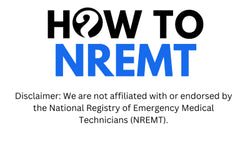When it comes to excelling in paramedic test prep, mastering the material isn’t enough. To truly succeed, you need to think critically under pressure. Critical thinking isn’t just a buzzword; it’s the backbone of effective decision-making during the NREMT Paramedic Exam and in real-world paramedic scenarios.
Let’s break down why critical thinking is so important and how you can sharpen this vital skill.
Why Critical Thinking Matters in Paramedic Test Prep
The NREMT Paramedic Exam is designed to assess more than memorization—it evaluates your ability to apply knowledge in high-stakes situations. That’s where critical thinking comes into play. This skill allows you to:
- Assess complex scenarios:Patient conditions are rarely straightforward. Critical thinking helps you prioritize what’s most important.
- Apply knowledge contextually:The exam tests your ability to adapt textbook knowledge to real-life emergencies.
- Make informed decisions:Quick, accurate decision-making can mean the difference between life and death in paramedic work.
In paramedic test prep, practicing critical thinking prepares you to analyze questions and select the best response, even when the options seem similar.

Breaking Down Critical Thinking for Paramedics
Critical thinking for paramedics involves a mix of cognitive skills and a calm mindset. Here’s what it encompasses:
1. Observation and Assessment
In any emergency, you must quickly assess a situation. In test scenarios, this skill is tested through detailed questions. Developing keen observation habits can improve your ability to spot key details in both practice and real exams.
2. Prioritization
Whether it’s triaging patients or choosing the correct sequence of actions, prioritization is vital. Use test prep materials to practice recognizing the most urgent issue in a given scenario.
3. Problem-Solving
Scenarios in paramedic test prep often present you with ambiguous situations. Problem-solving skills help you weigh different options and determine the best course of action.
4. Decision-Making Under Pressure
During the test, you’ll face time constraints. Developing confidence in your decision-making process reduces hesitation and errors.
Tips to Boost Critical Thinking in Paramedic Test Prep
If you’re looking to excel at your paramedic exam, follow these actionable tips:
1. Practice Scenario-Based Questions
Scenario-based questions are at the heart of the NREMT exam. Regular practice can help you develop a systematic approach to analyzing these scenarios. Break each question into parts:
- What’s the issue?Identify the primary problem.
- What’s the priority?Use the ABCs (Airway, Breathing, Circulation) to guide your response.
- What’s the best action?Choose the option that solves the problem while addressing the most critical needs.
2. Apply Spaced Repetition to Key Concepts
Spaced repetition helps reinforce critical concepts over time. Focus on areas where you struggle and revisit them regularly to ensure your knowledge is solid during test day.
3. Engage in Mock Scenarios
Create or participate in mock scenarios with peers. These exercises can mimic the thought processes required during the exam. After each scenario, reflect on what you did well and where you can improve.

Developing Mental Resilience
Critical thinking thrives on a clear mind. High stress can cloud judgment, so managing test anxiety is just as important as studying.
1. Practice Mindfulness
Simple mindfulness techniques can help calm your nerves and sharpen your focus. Spend five minutes each day practicing deep breathing to center your thoughts.
2. Simulate Test Conditions
Simulating the exam environment helps reduce surprises on test day. Set a timer, limit distractions, and complete practice exams in one sitting to build endurance and familiarity.
3. Analyze Mistakes
Mistakes are learning opportunities. After each practice test, review incorrect answers and identify the reasoning behind the correct choice. Understanding the “why” strengthens critical thinking.
Practical Techniques to Strengthen Critical Thinking
1. Use Mnemonics for Rapid Recall
Mnemonics like SAMPLE (Signs/Symptoms, Allergies, Medications, Past medical history, Last oral intake, Events leading up to illness) and OPQRST (Onset, Provocation, Quality, Radiation, Severity, Time) are tools for streamlining information processing.
2. Think Aloud
Talking through a scenario helps clarify your thought process. Even when practicing solo, verbalize your reasoning for each step.
3. Ask “What If?”
For each scenario, ask yourself what might happen if you choose a particular action. This habit enhances your ability to anticipate consequences, a skill that’s tested on the exam.
Common Mistakes and How to Avoid Them
It’s common to fall short during your paramedic test prep. Here we have outlined some of the common mistakes and how you can avoid them:
1. Overthinking Questions
Second-guessing can lead to errors. Trust your instincts and rely on your training to guide your decisions.
2. Rushing Through Scenarios
Time management is essential, but don’t rush at the expense of accuracy. Allocate time to read each question thoroughly before responding.
3. Focusing Solely on Memorization
While memorization is important, don’t neglect the application of knowledge. Practice applying concepts to various contexts for a well-rounded approach.
4. Critical Thinking in Real-World Contexts
Critical thinking doesn’t end with the NREMT exam—it’s a core competency in paramedic work. Developing this skill during test prep lays a foundation for effective decision-making in the field.
Consider this: When responding to a multi-casualty incident, critical thinking allows you to assess patient needs, delegate tasks, and prioritize treatments efficiently. Building these skills now ensures you’re prepared for the challenges ahead.
The road to becoming a skilled paramedic begins with preparation. Equip yourself with the tools, techniques, and mindset to make informed decisions under pressure. It’s not just about passing a test—it’s about being ready for the real-world challenges ahead.

How To NREMT: Take Your Prep to the Next Level
Ready to sharpen your critical thinking for paramedic test prep? How To NREMT offers resources tailored to your success. Access scenario-based practice questions, expert insights, and time-tested strategies designed to help you ace the exam.
Don’t leave your preparation to chance—start building the skills that matter today. Visit How To NREMT for your ultimate guide to mastering the NREMT paramedic test prep.

